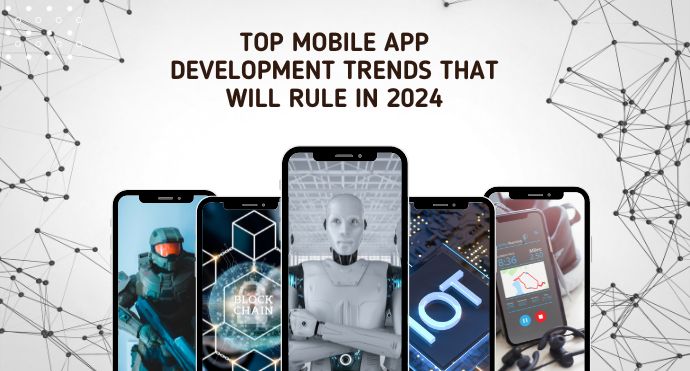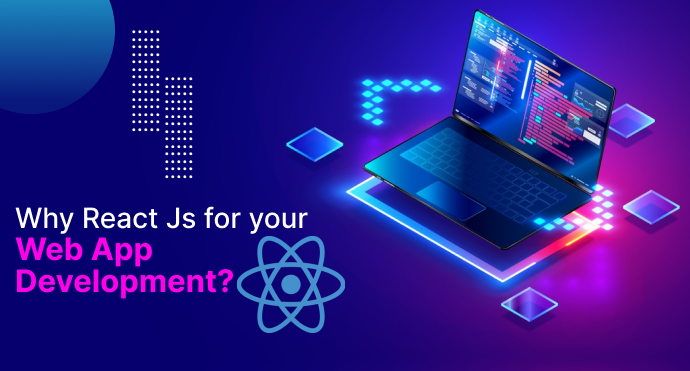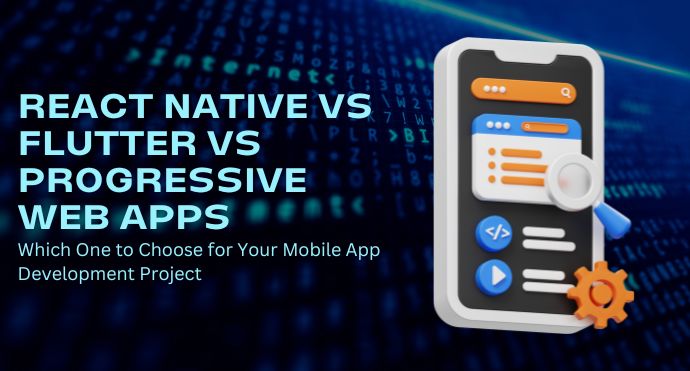Mobile app development is a constantly evolving field, with new trends and technologies emerging all the time. In order to stay ahead of the curve, it is important for mobile app developers to be aware of the latest trends and to incorporate them into their apps.
Here are some of the top mobile app development trends that are expected to rule in 2024:
1. Artificial intelligence (AI) and machine learning (ML)
AI and ML are two of the most transformative technologies of our time, and they are having a major impact on the mobile app development industry. AI and ML can be used to improve mobile app experiences in a variety of ways, such as:
- Personalization: AI and ML can be used to personalize mobile app experiences for each individual user. For example, an AI-powered music streaming app could recommend new music to users based on their listening history.
- Predictive analytics: AI and ML can be used to predict user behavior and to provide users with relevant information and recommendations. For example, an AI-powered shopping app could predict what products a user is most likely to be interested in and recommend those products to the user.
- Automation: AI and ML can be used to automate tasks within mobile apps. For example, an AI-powered email app could automatically sort and prioritize the user’s emails.
2. Augmented reality (AR) and virtual reality (VR)
AR and VR are two other technologies that are having a major impact on the mobile app development industry. AR and VR can be used to create immersive and interactive mobile app experiences in a variety of industries, such as gaming, entertainment, education, and healthcare.
For example, an AR-powered gaming app could allow users to interact with virtual objects in the real world. An AR-powered educational app could allow students to learn about different concepts through interactive simulations. And an AR-powered healthcare app could allow doctors to visualize a patient’s anatomy and to perform virtual surgery.
3. Internet of Things (IoT)
The IoT refers to a network of physical devices that are connected to the internet and that can collect and exchange data. IoT devices are becoming increasingly popular, and they are being used in a wide variety of applications, such as smart homes, smart cities, and industrial automation.
Mobile apps can be used to control and manage IoT devices. For example, a smart home app could allow users to control their smart lights, smart thermostat, and other smart devices from their smartphone.
4. On-demand apps
On-demand apps are becoming increasingly popular in a variety of industries, such as transportation, food delivery, and home services. On-demand apps allow users to request services at the touch of a button, and to have those services delivered to them quickly and conveniently.
Some examples of popular on-demand apps include Uber, Lyft, DoorDash, and Grubhub.
5. Cross-platform development
Cross-platform development frameworks allow developers to build mobile apps that can run on both Android and iOS devices. This can save developers time and money, as they only need to develop one codebase for both platforms.
Some popular cross-platform development frameworks include Flutter, React Native, and Xamarin.
6. Wearable device apps
Wearable devices, such as smartwatches and fitness trackers, are becoming increasingly popular. Wearable device apps allow users to access information and services on their wearable devices without having to reach for their smartphone.
Some examples of popular wearable device apps include Strava, Runkeeper, and Spotify.
7. Beacon technology
Beacon technology is a type of wireless technology that can be used to send signals to mobile devices that are within a certain range. Beacon technology can be used to create more engaging and interactive mobile app experiences.
For example, a beacon-powered retail app could send notifications to users when they are near a store that sells products that they are interested in. Or, a beacon-powered museum app could provide users with information about the exhibits that they are near.
8. Blockchain technology
Blockchain technology is the underlying technology that powers cryptocurrencies such as Bitcoin. Blockchain technology can be used to improve the security and transparency of mobile apps.
For example, blockchain technology could be used to create a mobile payment system that is more secure and efficient than traditional payment systems. Or, blockchain technology could be used to create a mobile voting system that is more secure and transparent than traditional voting systems.
9. Progressive web apps (PWAs)
PWAs are web apps that have the look and feel of native apps, but they are delivered over the web. PWAs are becoming increasingly popular because they are fast, reliable, and secure.
Some of the benefits of using PWAs for mobile app development include:
- PWAs are easier and cheaper to develop and maintain than native apps.
- PWAs can be installed on the user’s device, so they can be used offline.
- PWAs can be updated automatically, so users always have the latest version of the app.
10. Mobile wallets and payment gateways
Mobile wallets and payment gateways are making it easier and more convenient for users to pay for goods and services using their mobile devices. Some popular mobile wallets and payment gateways include Apple Pay, Google Pay, and PayPal.
Mobile wallets can be used to store the user’s credit or debit card information, and to make payments online or in stores. Payment gateways allow merchants to accept payments from mobile wallets and other online payment methods.
11. Biometric authentication
Biometric authentication is being used to improve the security of mobile apps. Biometric authentication methods such as fingerprint scanning and facial recognition can be used to verify the user’s identity before they are allowed to access the app.
Some popular mobile apps that use biometric authentication include banking apps, payment apps, and social media apps.
12. 5G technology
5G technology is the next generation of cellular network technology. 5G is expected to offer significantly faster speeds and lower latency than current 4G networks.
5G technology will enable new and innovative mobile app experiences. For example, 5G could be used to power augmented reality and virtual reality apps, as well as real-time streaming of high-definition video.
13. Voice-enabled applications
Voice-enabled applications are becoming increasingly popular and sophisticated. Voice-enabled applications allow users to interact with their mobile devices using voice commands.
Some popular voice-enabled applications include Siri, Google Assistant, and Alexa. Voice-enabled applications can be used to perform a variety of tasks, such as setting alarms, sending messages, and navigating to places.
Here is some more growthful data and real-life examples of the top mobile app development trends for 2024:
Artificial intelligence (AI) and machine learning (ML)
The global AI in mobile apps market is expected to grow from $17.5 billion in 2023 to $83.3 billion by 2028, at a CAGR of 38.3%.
Real-life examples:
- Netflix: Netflix uses AI to recommend movies and TV shows to users based on their viewing history.
- Spotify: Spotify uses AI to recommend music to users based on their listening habits.
- Amazon: Amazon uses AI to recommend products to users based on their purchase history.
Augmented reality (AR) and virtual reality (VR)
The global AR and VR market is expected to grow from $39.4 billion in 2023 to $305.5 billion by 2028, at a CAGR of 42.5%.
Real-life examples:
- Pokémon GO: Pokémon GO is an AR game that allows users to catch Pokémon in the real world.
- IKEA Place: IKEA Place is an AR app that allows users to place virtual IKEA furniture in their own homes to see how it would look.
- Google Lens: Google Lens is an AR app that can be used to identify objects in the real world and to provide information about them.
The global IoT market is expected to grow from $945.4 billion in 2023 to $1.9 trillion by 2028, at a CAGR of 14.2%.
Real-life examples:
- Amazon Echo: Amazon Echo is a smart speaker that can be used to control smart home devices, play music, and get information.
- Google Nest: Google Nest is a line of smart home devices that includes thermostats, cameras, and doorbells.
- Philips Hue: Philips Hue is a line of smart light bulbs that can be controlled remotely using a smartphone app.
On-demand apps
The global on-demand app market is expected to grow from $136.6 billion in 2023 to $335.8 billion by 2028, at a CAGR of 22.8%.
Real-life examples:
- Uber: Uber is an on-demand transportation app that allows users to request a ride at the touch of a button.
- DoorDash: DoorDash is an on-demand food delivery app that allows users to order food from their favorite restaurants and have it delivered to their door.
- Grubhub: Grubhub is another on-demand food delivery app that allows users to order food from their favorite restaurants and have it delivered to their door.
The global cross-platform development market is expected to grow from $26.7 billion in 2023 to $86.1 billion by 2028, at a CAGR of 25.7%.
Real-life examples:
- Flutter: Flutter is a cross-platform development framework that allows developers to build native-looking apps for iOS, Android, and the web.
- React Native: React Native is a cross-platform development framework that allows developers to build native-looking apps for iOS and Android using React.
- Xamarin: Xamarin is a cross-platform development framework that allows developers to build native-looking apps for iOS, Android, and Windows using C#.
These are just a few examples of the many real-life applications of the top mobile app development trends for 2024. As these trends continue to grow and evolve, we can expect to see even more innovative and groundbreaking mobile apps emerge in the years to come.
Conclusion:
These are just some of the top mobile app development trends that are expected to rule in 2024. Mobile app developers who are aware of these trends and who incorporate them into their apps will be well-positioned to succeed in the future.




Very informative article about Music streaming app Development. Thank you and Keep sharing like this!
Very informative article about Video Streaming app development. Thank you and Keep sharing like this!
Wow, this is an insightful overview of the mobile app development landscape in! The pace at which technology evolves never ceases to amaze me. The emphasis on Artificial Intelligence and Machine Learning integration into mobile apps is truly groundbreaking.
Wow, this is an insightful overview of the mobile app development landscape in 2024! The pace at which technology evolves never ceases to amaze me. The emphasis on Artificial Intelligence and Machine Learning integration into mobile apps is truly groundbreaking.
Too much detailed and informative for beginners and also for developers who want to develop a Home Services App. Thank you and Keep sharing like this!